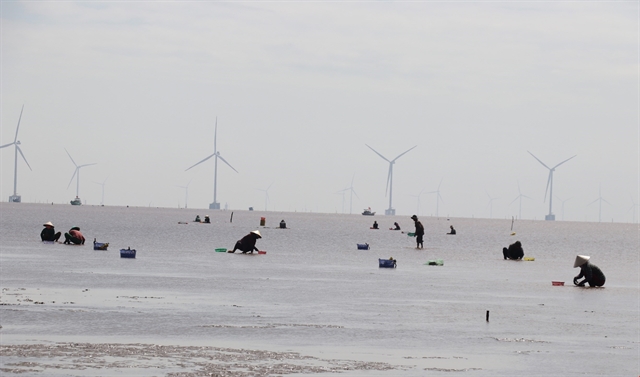 Economy
Economy

Designing and developing trademarks for local products should be a long-term strategy contributing to the development of a national trademark, said Deputy Minister of Industry and Trade.
 |
| A farmer in the northern Hưng Yên Province harvests longan. The product’s value has grown since its trademark was registered. - VNA/VNS Photo Đình Huệ |
HÀ NỘI – Designing and developing trademarks for local products should be a long-term strategy contributing to the development of a national trademark, said Deputy Minister of Industry and Trade, Đỗ Thắng Hải.
Hải told the National Trademark Forum for Local Products held in Hà Nội on Wednesday that localities in Việt Nam have striven to build their image closely linked with geographical characteristics to improve the national image in the international community.
“One of the factors for successful integration is to take advantage of the co-operation opportunities, as well as to build trademarks of localities with potential and strength,” he said.
However, the country, too, should continue to improve competitiveness of Vietnamese products in the world market by building a trademark, he added.
Nguyễn Quang Minh, deputy chairman of the People’s Committee of northern Hưng Yên Province, said competition among products would be given priority after Việt Nam’s FTA agreements take effect.
Minh said the province has paid attention to trademarks for their longan since 2004, having seen their importance in modern commerce.
The trademark has raised the value of the Hưng Yên longan and increased farmers’ incomes. However, the trademark development has shortcomings, such as limited marketing and advertisement, fake products and a lack of connection between production and consumption and a stable distribution system.
He said the Government should complete the mechanism, policies and legal framework for building and protecting trademarks in the agriculture sector.
Nguyễn Quốc Thịnh, an expert in the National Trademark Programme, suggested the building of a national trademark be linked to building a trademark for tourism destinations.
“Tourism destinations would contribute to increasing trademark reorganisation and encouraging the fastest feelings about a country,” Thịnh said.
The issue of national trademarks is of global interest, with some 80 countries implementing the programme. In Southeast Asia, all countries excluding Laos and Cambodia have implemented strategies for trademark development.
Registering abroad
Registration is imperative if businesses want to protect their trademarks, delegates told a seminar in HCM City on the same day.
Nguyễn Thị Hoài Thanh of the National Office of Intellectual Property of Việt Nam (NOIP) said trademarks are signs that serve the specific and primary purpose of identifying the goods and services of a producer.
They also help build trust in companies and play an important role in marketing and advertising, she said, adding that because a registered trademark is a form of intellectual property, businesses can license or assign it to others or restrict others from using it.
Vương Đức Tuấn of NOIP Việt Nam’s HCM City office, said with the ongoing integration, the demand to register Vietnamese trade marks abroad and foreign trade marks in Việt Nam has steadily increased.
There are two ways for Vietnamese firms to register their trademark abroad - directly in a country or through the Madrid system of the World Intellectual Property Organisation.
The latter offers people the possibility of having their trademarks protected in several countries by submitting an application directly to their own trademark office, he said.
In the past Vietnamese firms like Trung Nguyên Coffee spent a lot of time and money to protect their trademarks that had been appropriated by local and foreign firms, he said.
Therefore, it is vital for businesses, especially producers, to understand the importance of protecting their trademarks, he said.
Thanh said “The protection of a trademark is territorial. This means that the rights of a trademark are enforceable only in the countries where [it] is registered. Therefore, they must register their trademarks in markets they want to penetrate.”
Once a trademark is registered, the protection is valid for 10 years, and can be renewed.
Việt Nam as well as many ASEAN countries have adopted the first-to-file system, Thanh said.
So businesses should research trademarks before filing to avoid conflicts, she said.
Văn Tuyên, head of Nutifood’s legal department, said registration to protect trademarks abroad is not only complicated but also costly.
Businesses often do not know how to register in foreign countries or the duties and responsibilities of trademark owners, meaning they could easily lose their ownership rights, he said.
Vietnamese agencies should provide businesses with more information about intellectual property and the trademark application process in other countries, he said.
The seminar was organised by NOIP Việt Nam and the HCM City Intellectual Property Association. - VNS